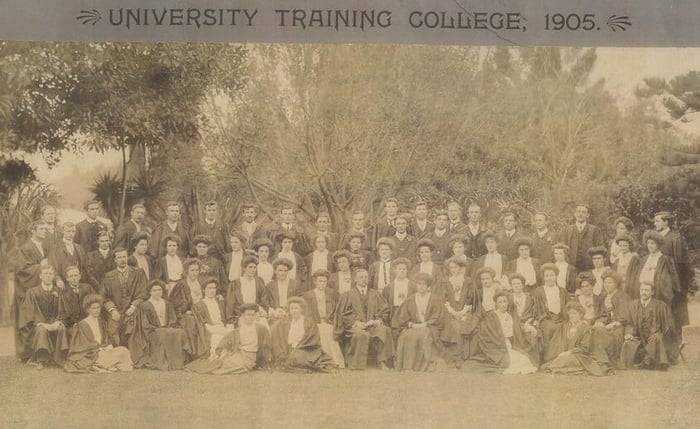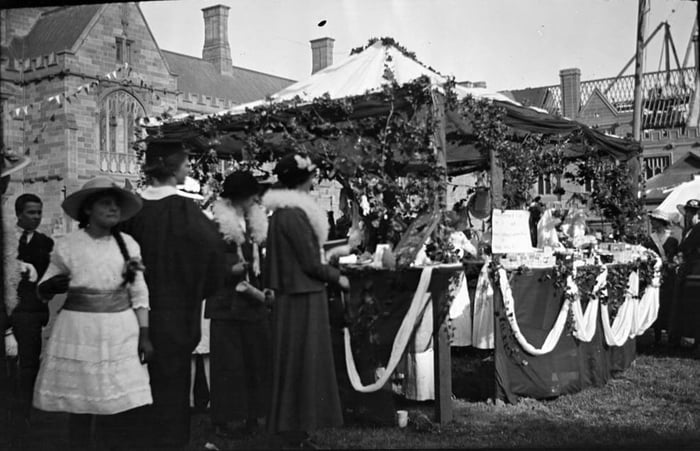
AN EXTRAORDINARY TEACHER
Image: Group photograph of trainee teachers at the University Training College, all wearing their academic gowns, including a young Adelaide Miethke.
The impact of the Great War on employment opportunities for women in Australia was not great. Unlike the demand for women to move into traditional male roles during the Second World War, during the Great War the number of women working outside the home only increased slightly, and mostly in food, clothing and printing industry jobs that were already established as female roles.
Unions were unwilling to let women take traditional male jobs for fear that this would lower wages, given working women were receiving only about 50% of the male wage for similar roles. Instead women were encouraged to help the war effort by joining voluntary organisations, such as the Australian Red Cross, the Country Women's Association, the Women's Christian Temperance Union, the Australian Women's National League, the Voluntary Aid Detachment, the Australian Comforts Fund and the Cheer-Up Society.
One profession that did offer women greater responsibility and opportunity was education. It cannot be certain that Adelaide Miethke’s future was underscored by her opportunities during the Great War. It was clear even before war’s onset that she was an extraordinary educator of her time and a woman with great passion for the causes she believed in.
Born on 8 June 1881 at Manoora, South Australia, ‘Addie’ was the sixth daughter of the ten children to Carl Miethke, a Prussian schoolmaster, and his wife, Emma (née Schultze). She became a pupil-teacher in 1899 and in 1903 - 1904 attended the University Training College.
Addie was always an avid campaigner for young girls’ education and in the war years she maintained her passion. In 1915, while a teacher at Woodville High School, she addressed the Women's Non Party Political Association, promoting the widely held view that 'technically gifted girls should have a chance of developing their bent'. That year she was founding president of the Women Teachers' League and in 1916 became first female vice-president of the South Australian Public School Teachers' Union. She was a forceful advocate for salary increases.
But Addie’s influence on our social fabric and recognition of women’s roles reached beyond the classroom. In 1915-17 she organised the South Australian Children's Patriotic Fund, mobilising schoolchildren for fundraising and scrap collecting (she did this in the Second World War also).
In 1920, while senior mistress of the girls' section at Woodville, she studied part time to complete her degree (B.A., 1924) and in 1924 was appointed an Inspector of Education for South Australia.
The SA Education Department said of schools that they were to train young women to become housewives of 'skill and taste' and in keeping with her time Addie ensured this was achieved. But she also believed that while ‘her home was a woman's place, it need not be her prison’ and she influenced that restructure of the system to accommodate broader learning for young girls.
In 1936, as president of the Women's Centenary Council of South Australia, she saw to the raising of £5000 to establish the Alice Springs base of the Australian Aerial Medical Service (later Royal Flying Doctor Service), as well as construction of the Pioneer Women's Memorial garden in Adelaide. The council produced the book ‘A Book of South Australia: Women in the First Hundred Years’. In 1937 Addie was awarded an O.B.E.
During the Second World War Addie directed the Schools Patriotic Fund (SPF) of South Australia, raising £402,133 to support the war effort. In 1941 she retired as a school inspector and served on the Women's War Service Council and as the first female president of the South Australian branch of the (Royal) Flying Doctor Service (FDS).
During these years Addie also edited the monthly schoolchildren's magazine, Children's Hour and in 1942 was founding president of the Woodville District Child Welfare Association.
After the Second World War the remaining funds in the SPF coffers were used to buy a hostel for country girls studying in Adelaide and to support the Flying Doctor Service. The hostel – ‘Adelaide Miethke House’ – opened in 1951 and was administered by the Young Women's Christian Association, to which Addie also belonged.
In 1946 while travelling to Alice Springs for the FDS she was inspired to help ‘homestead’ children isolated by distance to get a better education and social life. She created a new radio education service as part of the FDS. This was the world’s first school of the air and its first lessons were delivered on pedal powered radios in September 1950. The School of the Air continues to this day.
In 1949 Addie organised the United Nations Appeal for Children. This was her last major fundraising appeal but she maintained her association with club and committee work: the Girl Guides' Association (commissioner and State council-member); the Royal Commonwealth Society; the National Council of Women, of which she was State and national president; the Adelaide Women's Club and the Catherine Helen Spence Scholarship Committee.
Adelaide Miethke died at her Woodville home of seventy years on 4 February 1962 and was buried in Cheltenham cemetery.























